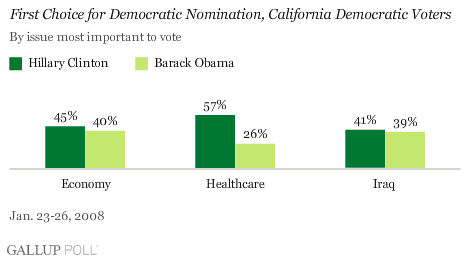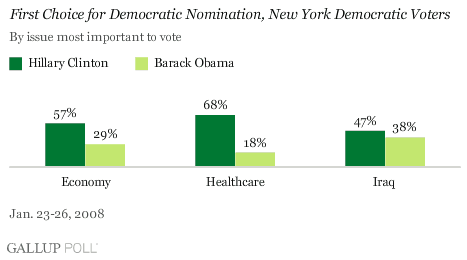PRINCETON, NJ -- Two recent USA Today/Gallup polls in the key Super Tuesday states of California and New York show Hillary Clinton with a significant lead over second-place Barack Obama among Democratic voters in both states. Clinton's margin over Obama, however, varies significantly among subgroups of Democrats when they are grouped according to the issue they feel is most important to their vote. Clinton generally does best relative to Obama among Democratic voters who are most concerned about healthcare, does less well among those focused on the economy, and is least well positioned vis à vis Obama among voters whose top concern is the war in Iraq.
Democratic voters in both states were given five issues and asked which would be most important to them in their vote for their party's nominee. Of the five, three were most frequently selected by voters in both states: economic conditions, Iraq, and healthcare. Few Democratic voters in either state selected illegal immigration or terrorism.
There were differences in candidate support among voters who selected each of these three top issues in both states.
In California, Clinton does very well among voters most concerned about healthcare, beating Obama by a 31-point margin. Among voters concerned about the economy, however, she is just 5 points ahead of Obama. And, among those who name Iraq as their top issue, the two are essentially tied, with Clinton leading by just 2 points.

In New York, Clinton beats Obama among voters who select each of the three issues as most important. This is not surprising given her overall 28-point margin on the basic ballot in her home state.

But again, as was the case in California, Clinton has her strongest positioning among voters who say that healthcare is their top issue, beating Obama by 50 points. Among those who say the economy is most important, she is ahead by 28 points. And, among those most concerned about Iraq, Clinton wins over Obama by only 9 points.
Implications
These data make it clear that support for Clinton among Democratic primary voters in the two key states of California and New York is significantly correlated with the issue of most concern to those voters.
Among voters who are most concerned about healthcare, Clinton wins strongly in both California and New York. This is in part a legacy of her role in seeking to reform healthcare in the early years of her husband's administration. On the other hand, voters who are most concerned about Iraq give her much less of a margin over Obama, to the point where she essentially ties him among California Democratic voters. This may reflect the fact that -- as Obama has been stressing on the campaign trail -- Sen. Clinton voted for the initial Iraq resolution in the Senate, while Obama was publicly against it. Finally, for voters most concerned about the economy, Clinton's strength against Obama in California is less than her overall support, while in New York it is about the same as her overall support. This suggests that Obama could have an edge if, in the final days before Super Tuesday, his California campaign focuses on the important issue of the economy.
Survey Methods
These results are based on telephone interviews with randomly selected samples of 779 California Democratic registered voters who plan to vote (or have already voted) in the California Democratic presidential primary, and 767 New York Democratic registered voters who plan to vote in the New York Democratic presidential primary. For results based on these samples, one can say with 95% confidence that the maximum error attributable to sampling and other random effects is ±4 percentage points.
Interviews are conducted with respondents on land-line telephones (for respondents with a land-line telephone) and cellular phones (for respondents who are cell-phone only).
In addition to sampling error, question wording and practical difficulties in conducting surveys can introduce error or bias into the findings of public opinion polls.
